|
|
|
Sort Order |
|
|
|
Items / Page
|
|
|
|
|
|
|
| Srl | Item |
| 1 |
ID:
162496
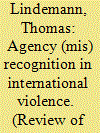

|
|
|
|
|
| Summary/Abstract |
This contribution introduces a reconceptualisation of misrecognition that stresses ‘creative agency’ (gift, work, etc.) as a condition of self-consciousness. Drawing on Hegel’s The Phenomenology of Spirit, I argue that recognition struggles are often less motivated by the actors’ desire to have a special status than by the desire to make a ‘contribution’ to society, to ‘give’ something. The content of a socially valued contribution-gift (as per Marcel Mauss) varies from one society to another but it is linked to the very ability of actors to act on their ‘own’ and to shape their environment. Thus, subjects identifying with political units or social groups with little recognised agency, while imagining strong abilities to contribute to a given society, will easily feel slighted. It is impossible to be recognised as ‘subjects’ if one is denied in the ability to ‘contribute’ to a given society. I apply this perspective to the case of French jihadism, based on 13 interviews with prisoners in France suspected to belong to al-Qaeda or the Islamic State. These individuals experience ‘individual’ agency denial inside the ‘national’ community, but also agency denial of ‘Muslim sovereignty’ outside.
|
|
|
|
|
|
|
|
|
|
|
|
|
|
|
|
| 2 |
ID:
162488


|
|
|
|
|
| Summary/Abstract |
In this article, the introduction to this Special Issue, we underline the importance of the dynamics of misrecognition for the study of world politics. We make the case for shifting the focus from ‘recognition’, where it has long been cast in social, political and, more recently, International Relations theory, to misrecognition. We do so by returning to the original theorisation of misrecognition, Hegel’s dialectic of the master and servant. Our point of departure is not only that the desire for recognition is key social dynamic, but that the failure to obtain this recognition is built into this very desire. It is a crucial factor for understanding how international actors behave, including, but not only, states.
Thus understood, the desire for recognition is not simply a desire for social goods, for status or for statehood, but for more agency – more capacity to act. We explore the logic of misrecognition and show how the international system is a symbolic structure that is ordained by an unrealisable ideal of what we call ‘sovereign agency’.
|
|
|
|
|
|
|
|
|
|
|
|
|
|
|
|
| 3 |
ID:
092441
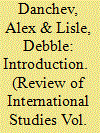

|
|
|
|
|
| Publication |
2009.
|
| Summary/Abstract |
You can refute Hegel, wrote Yeats, but not the Song of Sixpence.All of the contributors, supporters and scene-shifters of this section start from the assumption that art matters, ethically and politically;affectively and intellectually.
|
|
|
|
|
|
|
|
|
|
|
|
|
|
|
|
| 4 |
ID:
109862
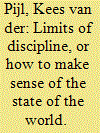

|
|
|
| 5 |
ID:
162492
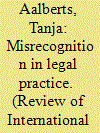

|
|
|
|
|
| Summary/Abstract |
This article discusses the concept of misrecognition to analyse international legal ordering in the practice of colonial treatymaking. As critical interventions to the debate on recognition have made clear, recognition is about exclusion as much as it is about inclusion. The most obvious example is the nineteenth-century applications of the standard of civilisation, where the European Family of Nations introduced the criterion of ‘civilisation’, which excluded non-European entities as sovereigns and legitimised their colonisation. But at the same time colonial treaties included the ‘savage rulers’ as signatory powers, and thus legal persons within the international legal order that at once excluded them. This contribution to the Special Issue discusses these treatymaking practices as a practice of misrecognition; not because it misrecognises some natural, essential, or true identity of the indigenous entities, but as a misrecognition of the international order’s own conditions of possibility through practices that simultaneously constitute that order and undermine its constitutive conditions. A rereading of Hegel’s famous master–slave metaphor through the concept of misrecognition sheds light on the reversals and contradictions of the colonial legal enterprise and reveals the aporia of the contemporary international legal order by showing the void at its heart.
|
|
|
|
|
|
|
|
|
|
|
|
|
|
|
|
| 6 |
ID:
162493
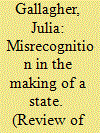

|
|
|
|
|
| Summary/Abstract |
This article draws on a Kleinian psychoanalytic reading of Hegel’s theory of the struggle for recognition to explore the role of international misrecognition in the creation of state subjectivity. It focuses on Ghana’s early years, when international relations were powerfully conceptualised and used by Kwame Nkrumah in his bid to bring coherence to a fragile infant state. Nkrumah attempted to create separation and independence from the West on the one hand, and intimacy with a unified Africa on the other. By creating juxtapositions between Ghana and these idealised international others, he was able to create a fantasy of a coherent state, built on a fundamental misrecognition of the wider world. As the fantasy bumped up against the realities of Ghana’s failing economy, fractured social structures, and complex international relationships, it foundered, causing alienation and despair. I argue that the failure of this early fantasy was the start of Ghana’s quest to begin processes of individuation and subjectivity, and that its undoing was an inevitable part of the early stages of misrecognition, laying the way for more grounded struggles for recognition and the development of a more complex state-subjectivity.
|
|
|
|
|
|
|
|
|
|
|
|
|
|
|
|
| 7 |
ID:
079482
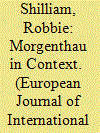

|
|
|
|
|
| Publication |
2007.
|
| Summary/Abstract |
By what criteria might the human condition be considered `tragic'? In this article I argue that historically contextualizing the criteria by which Morgenthau judged the human condition to be tragic requires a sensitivity to what might be called the `international dimension' of knowledge production. Specifically, I argue that Morgenthau's tragic sense of the relation between liberal ethics and the reality of politics was constructed as a reaction to a preceding set of intellectual engagements - exemplified by the political philosophies of Georg Hegel and Max Weber - with the perceived `backward' nature of the `liberal' project in Germany in comparison to that of republican France and capitalist Britain. Through this investigation I argue that inter-societal difference is not simply an object of political theory, but at a deeper level generative in the historical construction of that thought itself. This argument has implications for Morgenthau's recent resurrection as a critical voice on the separation of ethics and politics in International Relations theory
|
|
|
|
|
|
|
|
|
|
|
|
|
|
|
|
| 8 |
ID:
162489
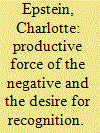

|
|
|
|
|
| Summary/Abstract |
In this article I theorise the concept of misrecognition that we aim to bring to the study of international politics with this Special Issue. I draw upon three sources to do so: recognition theory, Hegel, and Jacques Lacan. I show that, while the seeds of an interest in misrecognition were laid in that interdisciplinary Hegelian scholarship known as recognition theory, it remains underdeveloped. To develop it into a concept I chart a path through recognition theory back to Hegel’s original dialectic of the master and servant in the Phenomenology of Spirit. What the dialectic captures, I argue, are the actual dynamics of misrecognition in social life, not an idealised form of recognition. This foundational, constitutive misrecognition is what Lacan also theorises by way of his concept of ‘fantasy’. Both Hegel and Lacan foreground a misrecognised, desiring subject that challenges the ways in which agency has been understood in international politics. Lastly, I show the purchase of a Hegelian-Lacanian analysis for IR by considering the relations between sovereignty and nuclear weapons under the lens of fantasy.
|
|
|
|
|
|
|
|
|
|
|
|
|
|
|
|
| 9 |
ID:
082706
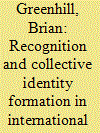

|
|
|
|
|
| Publication |
2008.
|
| Summary/Abstract |
Applying the model of `recognition politics' to international relations can help to explain the identity-based elements of international conflicts that rationalist models leave out. This article uses psychological theories of identity formation to critically assess the recent move by constructivist scholars (most notably Alexander Wendt) to bring the Hegelian idea of the `struggle for recognition' into the study of IR. Examining recognition theory in this way shows that while the insights of `identity theory' developed in the symbolic interactionist tradition lend support to the idea that recognition of the `other' is essential to constituting the identity of the `self', much of the experimental work carried out within Social Identity Theory and its related fields fails to support the claim that recognition leads to the formation of an over-arching collective identity. Without a credible mechanism for collective identity formation, recognition theory fails to predict fundamental change in the international system.
|
|
|
|
|
|
|
|
|
|
|
|
|
|
|
|
|
|
|
|
|